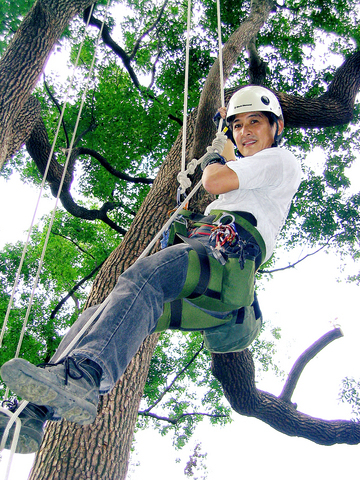For most retirees, earthbound leisurely pastimes such as golf or hiking are great ways to unwind. Retired photojournalist Elliot Su (
Dangling from a thick rope 60m above the ground with no safety net may not be everyone's idea of fun, but for Su and other members of the Tree Climbing Taiwan Association the view is always greener from the top of a towering Taiwan redwood or Japanese cedar.

PHOTO: GAVIN PHIPPS, TAIPEI TIMES
Su said that from the top of a tree you're able to get a different view of the world. "There's nothing quite like being able to see birds and insects close-up and in their natural environments," he said.
Su first became interested in the pastime after he picked up a tree-climbing magazine while holidaying in the British seaside resort Eastbourne.
He contacted the US-based association Tree Climbing International and within a few months was in Atlanta, Georgia, studying under the guidance of tree-climbing guru, Peter "Treeman"
Jenkins.
After three months extensive training, Su became a certified member of Tree Climbing International and Taiwan's first tree-climbing instructor.
Since founding the Taiwan chapter of Tree Climbing International just over a year ago, Su has taught over 1,000 recreational climbers and worked in close conjunction with universities, environmental groups and government bodies as well as charity organizations.
In order to qualify as an expert tree climber, students have to undertake a three-day extensive course focusing on the intricacies and techniques need to master tree climbing, and then must climb 25 trees of 10 different species. The course has not been adapted in any way and complies to the guidelines laid down by Tree Climbing International.
Tree climbing is not cheap and while the association loans equipment to its students, graduates wanting to go it alone have to purchase equipment specially imported from the US. Even with this equipment, which costs upwards of NT$20,000, climbers' safety is not guaranteed. Neither Su nor any of his students have fallen from a tree, but tree-dwelling creatures have attacked the tree-loving, tree-climbing retiree.
"I was trying to remove a bee's nest from a tree so that we could take a class of children up. The entomology students told me that bees don't attack after dark, but this proved incorrect," Su said. "I'd climbed into the tree and was about to remove the nest when I was stung by a single killer bee."
Within minutes of the accident Su's hand had, according to the tree-climbing expert, "turned into bread" and swollen to twice its normal size. As a result of the bee sting, Su was kept in hospital for three days, pumped with drugs and kept under close observation.
While Su and his fellow climbers ask permission before climbing any tree, be it in Wulai, Nantou or Hualien and currently only undertake inner-city climbs in a couple of Taipei parks, he does have his eyes set on a nice tree-lined stretch of downtown Taipei.
"I'd love to climb the trees along Dunhwa North and South roads. I think it would be great fun and because of the public nature of such a climb, it would be great way to introduce tree climbing and encourage people to take more notice of Taiwan's natural environment," he said.
For further information about the Tree Climbing Taiwan Association, log on to its Chinese-language website at www.treeclimbingtaiwan.org. Those interested in taking to the canopies can contact the association directly by calling (0936) 888 997 or by fax at (02) 2391 8145. Class times and other information can also be obtained via e-mail at boysu@yam.com.

Growing up in a rural, religious community in western Canada, Kyle McCarthy loved hockey, but once he came out at 19, he quit, convinced being openly gay and an active player was untenable. So the 32-year-old says he is “very surprised” by the runaway success of Heated Rivalry, a Canadian-made series about the romance between two closeted gay players in a sport that has historically made gay men feel unwelcome. Ben Baby, the 43-year-old commissioner of the Toronto Gay Hockey Association (TGHA), calls the success of the show — which has catapulted its young lead actors to stardom -- “shocking,” and says

Inside an ordinary-looking townhouse on a narrow road in central Kaohsiung, Tsai A-li (蔡阿李) raised her three children alone for 15 years. As far as the children knew, their father was away working in the US. They were kept in the dark for as long as possible by their mother, for the truth was perhaps too sad and unjust for their young minds to bear. The family home of White Terror victim Ko Chi-hua (柯旗化) is now open to the public. Admission is free and it is just a short walk from the Kaohsiung train station. Walk two blocks south along Jhongshan

The 2018 nine-in-one local elections were a wild ride that no one saw coming. Entering that year, the Chinese Nationalist Party (KMT) was demoralized and in disarray — and fearing an existential crisis. By the end of the year, the party was riding high and swept most of the country in a landslide, including toppling the Democratic Progressive Party (DPP) in their Kaohsiung stronghold. Could something like that happen again on the DPP side in this year’s nine-in-one elections? The short answer is not exactly; the conditions were very specific. However, it does illustrate how swiftly every assumption early in an

Snoop Dogg arrived at Intuit Dome hours before tipoff, long before most fans filled the arena and even before some players. Dressed in a gray suit and black turtleneck, a diamond-encrusted Peacock pendant resting on his chest and purple Chuck Taylor sneakers with gold laces nodding to his lifelong Los Angeles Lakers allegiance, Snoop didn’t rush. He didn’t posture. He waited for his moment to shine as an NBA analyst alongside Reggie Miller and Terry Gannon for Peacock’s recent Golden State Warriors at Los Angeles Clippers broadcast during the second half. With an AP reporter trailing him through the arena for an